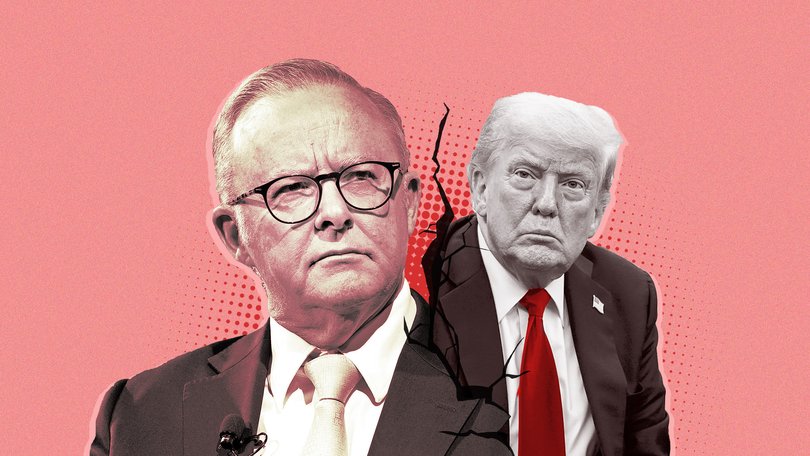ANDREW CARSWELL: Experts worry about the deteriorating Australia-US relationship, punters couldn’t give a toss
ANDREW CARSWELL: The very chaos critics hoped would expose Albanese’s flaws in US diplomacy is instead helping to recast him as a steady leader.

On the long flight home from the G7 summit, fresh from his doomed bid to meet with Donald Trump, Anthony Albanese marched down the back of his jet to the media pack jammed into economy.
It’s a common practice for prime ministers on international flights to share a beer with the press pack at 40,000 feet. Nothing like a few forced smiles and awkward laughs to paper over tensions.
But this time, Albanese wasn’t there to charm.
Sign up to The Nightly's newsletters.
Get the first look at the digital newspaper, curated daily stories and breaking headlines delivered to your inbox.
By continuing you agree to our Terms and Privacy Policy.“You guys are obsessed with Donald Trump,” the PM snapped.
The barb drew groans. Yet another chapter in the PM’s undisguisable distaste of scrutiny.
But he wasn’t entirely wrong.
The press pack was rightly “obsessed” with the PM’s ongoing failure to secure a meeting with the US President, given the significant geopolitical and economic implications for Australia.
It deserved the prominence and scrutiny it received.
But where Albanese’s detractors have miscalculated is in assuming that the ongoing drama — of whether or not he meets with Trump, coupled with tensions with the US over tariffs and defence spending — is doing him political damage at home.
To believe that is to underestimate the depth of Australian antipathy toward Donald Trump, and to overestimate how closely most voters follow the intricacies of foreign policy.
Australians see only tiny glimpses of Federal politics amid a busy montage of their daily happenings. It is barely peripheral to the important things that are front of mind in most households.
So while critics frame Albanese’s persistent push-back against the Trump administration as arrogant or stubborn, and his failure to secure a meeting with Trump as a sign of weakness and irrelevance, the public may be seeing something else entirely.
In those brief glimpses voters are more likely to see a Prime Minister standing up to a belligerent US President who is clearly coercing, even bullying, Australia into submission. The alternate narrative doesn’t seem to be finding fertile soil. And any attempts by the Coalition to pin this relational breakdown on Albanese are falling flat.
Strange as it may seem, given his irrational first term, Albanese suddenly looks like the sensible adult in a room full of schoolyard scrappers.
Putting aside all the valid arguments that Albanese should be pushing harder and giving more ground, to stave off the ever-present threat of tariffs and a watered-down AUKUS arrangement, voters appear to be affording Albanese grace for simply by having to deal with Trump and his maelstrom of an administration.
A gesture of sympathy, if you will. Not because they are in love with the fella. But because Trump is an affront to their sensibilities.
It doesn’t make Albanese’s posture to the US correct.
But the public isn’t exactly pouring over broadsheet columns that expertly expose the risks of Albanese’s approach to foreign affairs. Their opinions are not being formed from exhaustive analysis outlining the ramifications that this awkward standoff with Washington may have on Australia.
They are informed by the tiny glimpses they see of this saga. That one snapshot that in this case, more often than not, only reinforces what they know and hate about Trump.
To Albanese’s immense benefit.
It seems the very chaos critics hoped would expose Albanese’s flaws is instead helping to recast him as steady, not uncertain; resolute, not weak. For many voters, their sheer disdain for Trump far outweighs any concern that Albanese appears evasive and incompetent in dealing with him.
This is a trap for conservatives. The risk of overreaching based on false assumptions could not only bolster Albanese’s standing but also reinforce the perception that the Coalition is out of touch.
Ironically, it’s the opposite argument being levelled at Albanese by his critics over his approach to China. That he’s too soft, too accommodating; a Prime Minister seen as kowtowing to a Communist regime, putting adversaries ahead of allies, and getting close to a country that some fear could one day threaten our security.
Commentators have accurately outlined those risks. And those risks are real, given China’s appetite for expansionalism and its alarming military build-up that will elevate it to apex predator by 2027.
What concessions did Albanese give to be afforded a visit to China this week? What are the consequences for this increasing alignment with Beijing instead of Washington?
Genuine questions.
But are the voters asking them?
Or do they see, in those minute glimpses, a Prime Minister building trade relations with our biggest trading partner; a Prime Minister having open talks with a superpower we can’t afford to ignore, or provoke?
Focus group research routinely shows that while Australians are wary of getting too close to China, they overwhelmingly support strong trade and economic ties between the two nations.
They know who butters their bread.
It’s not that Australians are blind to the risks of cosying up to China or the costs of mismanaging ties with Washington. But in a world of increasing global uncertainty and bad faith actors, they appear to be giving Albanese credit for staying steady.
Steady may not make him right.
But for now, steady may be enough.
